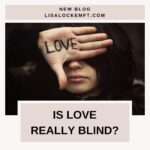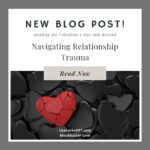We’ve all heard the phrase “Love Is Blind.” As a matter of fact, the Netflix hit TV show “Love Is Blind” has presented this juicy topic of whether love truly is blind on a global stage. After watching the final U.S. episode of season 6, I was inspired to write this post to explore what is meant by this popular expression. Is it even true? And how does authenticity and fear of showing our true selves play a role?
Now, when people throw around the phrase “love is blind,” they usually mean that love doesn’t care about looks or flaws. It’s all about that deep emotional connection, right? Well, the TV show “Love Is Blind” takes this idea to the extreme by tossing contestants into pods where they can only talk to each other, no peeking allowed. Talk about taking risks!
It does sound like a very intriguing experiment though–thus the high ratings I’m sure. But in my opinion, season 6 in particular, diverts a bit from its true intention when a few contestants seem to hint at the importance of looks and outright asks about race and physical features and even go so far as to compare themselves to a celebrity look alike. Which would suggest that perhaps love isn’t blind.
But here’s the kicker: most people go into relationships with rose-colored glasses and limited information. The infatuation can feel like love, which might start blind, but sooner or later, reality smacks us in the face. “Love Is Blind” shows us this as the couples finally meet face-to-face and have to deal with physical attraction and, well, all the other stuff that comes with it. It’s like the show is saying, “Hey, love might be blind at first, but eventually, you gotta open your eyes.”
But you know what? Opening our eyes isn’t always easy. Fear of being authentic in relationships is a real thing. We’re scared that if we show our true selves, flaws and all, we’ll get rejected. And let’s not forget about society’s pressure to look perfect all the time. Who hasn’t felt the need to keep up appearances, especially in the age of Instagram filters and photo editing?
The field of psychology has offered the following reasons for this common fear of authenticity:
- Social Norms: Social psychology suggests that certain norms often dictate behaviors or appearances that are considered acceptable, leading individuals to fear judgment or rejection if they deviate from these norms.
- Self-Concept: This theory proposes that individuals who have a negative self-concept may fear showing their true selves because they worry about being perceived as unworthy or unlovable.
- Insecure Attachment: Attachment theory submits that early experiences with caregivers shape individuals’ attachment styles and impact their ability to be authentic in relationships. Those with insecure attachment styles may fear vulnerability and authenticity due to past experiences of rejection or abandonment.
- Fear of Rejection and Judgment: Psychologists recognize that the fear of rejection and judgment plays a significant role in the fear of authenticity. Individuals may worry that if they reveal their true selves, they will be rejected or criticized by others, leading them to hide behind a facade to protect themselves from potential harm.
- Impostor Syndrome: Impostor syndrome, a psychological phenomenon where individuals doubt their abilities and fear being exposed as a fraud, can contribute to the fear of authenticity. People experiencing impostor syndrome may feel that they are not deserving of success or love, leading them to hide their true selves to avoid being “found out.”
Overall, psychology suggests that the fear of showing our true selves stems from a combination of social, cognitive, and emotional factors.
In “Love Is Blind,” we see contestants wrestling with these fears. They want to be loved for who they are, but they seem terrified of really being vulnerable. This shows up in the form of lies and deceit. It’s like they’re playing a game of emotional hide-and-seek, hoping their true selves won’t get found out.
But here’s the thing: authenticity is the secret sauce of real relationships. It’s about letting down your guard and showing your partner the messy, imperfect, wonderfully human side of yourself. Because let’s face it, nobody’s perfect, and pretending otherwise only leads to heartache.
So, as we navigate the crazy world of love and relationships, let’s remember that being authentic isn’t something to be feared—it’s something to be celebrated. It’s what allows us to connect with someone on a deeper level, flaws and all. And sure, love might start blind, but if we want it to last, we’ve gotta open our eyes and see each other for who we truly are.
In the end, whether love is blind or not, one thing’s for sure: being authentic is the key to finding the real deal. So let’s ditch the masks, drop the pretenses, and let love in, imperfections and all. After all, don’t we all want to be truly known, loved, and accepted for who we are? And how can we know if we are truly loved for who we are if we are pretending to be someone we are not?
Most often it starts with knowing yourself and practicing self-love and self-acceptance. When we are self-aware and compassionate with ourselves there is less fear of being vulnerable and we tend to be more compassionate towards others. So as we navigate the complexities of love and connection, let’s embrace authenticity, vulnerability, and acceptance, and allow these qualities to illuminate the true power of love.
If you are interested in more topics about love and healthy relationships please check out my book Blockbuster Love: Lessons from the Movies on How to Create Lasting Love Part 1-Romance. In this book, I talk about the beginning stages of relationships and highlight popular movies that teach valuable lessons. Also, be on the lookout for the second book in the series (Part 2-Reality) coming soon. In part two I discuss the realities of long-term relationships and what happens when your eyes are wide open. Grab some popcorn, watch some cool movies, and let’s learn more about love.


